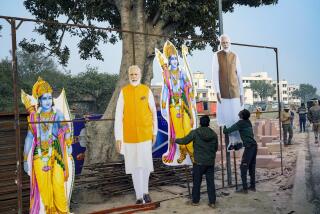India’s Jaipur Literature Festival is one for the books
It’s been called the greatest literary show on Earth, a thinking person’s carnival. The Jaipur Literature Festival, which wrapped up Tuesday, is India at its best, and occasionally not-so-best, proving that the proud emerging nation can easily trounce China in at least this category: the soft-power world of ideas, debate, criticism and a willingness to question authority.
The festival is a five-day see-and-be-seen brain scrum featuring India’s (and increasingly the world’s) literati. In its sixth year, it’s already Asia’s largest book festival, rivaling the global ranks of Edinburgh, Melbourne, Frankfurt and Berlin.
With one difference: Jaipur charges no admission and welcomes all comers, leaving ambassadors to fight it out with students for seats.
“I’ve never seen such an alive, vibrant festival,” said Niki Marangou, a novelist who traveled from Cyprus to attend. “I really love the fact that it’s open to everyone.”
Also in contrast to other book festivals, most of which are “for the trade” and focused on contract signings, the priority here is good humor, fun and ideas.
Several author sessions are held at once in tents bedecked with colorful bunting on the grounds of the elegant 150-year-old Diggi Palace, now a hotel owned by descendants of a 16th century Mughal emperor’s political advisor whom the venue’s website calls the founder of a “virile,” “fiery and impetuous” line.
“We had 14 people at the first reading I did in 2005,” said William Dalrymple, festival director and author of several historical books. “In six years, it’s grown to 50,000 people.”
The open-gate policy also means massive logjams between sessions, mirroring India’s roads outside the palace, and a certain amount of the disorganization India is famous for. But the price is right, as is the atmosphere.
The eclectic crowd of authors, wannabe writers, businesspeople and hoi polloi includes hundreds of students in blazers and ties, some busy approaching anyone who looks vaguely important, including random Westerners, for autographs.
The growing buzz has also attracted New Delhi’s bejeweled socialites, who may not read much beyond their credit card slips but relish the chance to drop names and tales of sightings back home.
And there’s plenty of opportunity for that given Bollywood luminaries and about 220 authors from 23 countries were in attendance. This year saw a slew of Man Booker Prize winners along with Nobel laureates Orhan Pamuk, author of “Snow,” and J.M. Coetzee, who after wrapping up his reading from “The Old Woman and the Cats” was congratulated by historian Patrick French for the “remarkable task of having kept an Indian audience silent for 45 minutes.”
Among the big-name Western writers were Richard Ford, Martin Amis and a stiletto-heeled Candace Bushnell, author of “Sex and the City,” who, despite her reputation, espoused the benefits of fidelity and commitment.
Several from India’s growing stable of literary show horses were also in attendance, including Vikram Seth, who wrote “A Suitable Boy,” and Gurcharan Das, author of “India Unbound.”
But it’s the ideas that drew the crowds, including sessions on the novel, the art of writing and a rather heated panel on globalization and whether non-Western writers of color were afforded fewer opportunities.
“One thing I like about the literary world, there are enough hurt feelings to go around,” said Vietnamese Australian writer Nam Le, author of “The Boat.” “Even white guys in Brooklyn feel they’re marginalized.”
The artists-about-art focus was interspersed with weightier sessions on current affairs, including Kashmir, caste, Afghanistan-Pakistan strategy and the occupation of the Palestinian territories.
The festival, previously criticized as having an overly Western focus, this year included sessions on works in the Hindi, Sanskrit, Urdu, Tamil, Gujarati, Nepali and Kashmiri languages, among others.
“We’ve touched on a rich scene,” Dalrymple said, explaining the festival’s success. “There’s fantastic literature going on in 70 languages in this country. Americans and Europeans get to read a very small percentage of this.”
But some said the festival’s success is taking a toll.
“It used to be so democratic, but we’re starting to see an end to that flat structure, with only big-name authors getting the best venues,” said one publishing executive who asked not to be identified, citing the industry’s catty nature. “At the same time, you do start thinking about security as the crowds increase and anyone can walk in.”
India is the world’s third-largest English book market after the United States and Britain, and is growing at 15% annually, compared with about 2% in the U.S. In a world where books and the luxury of a slow read often seem endangered amid obsessive mouse-clicking, India’s love affair with literature remains on ample display in Jaipur.
“It’s a great experience and very inspiring,” said Soumya Sankar, 18, a college math student. “Who knows, maybe someday I’ll write a book about math.”
More to Read
Start your day right
Sign up for Essential California for news, features and recommendations from the L.A. Times and beyond in your inbox six days a week.
You may occasionally receive promotional content from the Los Angeles Times.






